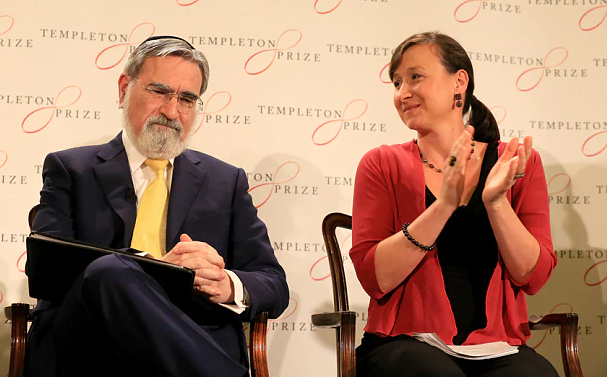But in practice it was the Haredi he found himself placating most: avoiding gay groups, doing little to advance the role of women, and his most regrettable mistake, refusing to attend the funeral of a much-loved Reform rabbi, Hugo Gryn, and calling him a destroyer of the faith. A great chief rabbi, to the Gentiles, a fair number said, noting his easier mixing with prime ministers and royals. The Haredi, not won over, called him "Boychik", wet behind the ears.
但实际上,他发现自己最安抚的是极端传统犹太教徒:避开同性恋群体,他对提升女性的作用做得很少,他犯了一个最令人遗憾的错误,拒绝参加一位深受喜爱的改革派拉比的葬礼,雨果·格林,并称他为信仰的毁灭者。一个伟大的拉比,对许多非犹太人而言,注意到他更容易与首相和皇室成员交往,极端正统派也没有站在他这一边,说他没有经验,太年轻。

Perhaps he was. He never set out to be a rabbi; the impulse had grown very slowly, from that first sense of the mystery of God, when he was two or three, in the sadness of the music at his grandfather's tiny synagogue in Finchley. He did not even feel especially Jewish until, at Cambridge, the Six-Day War of 1967 suddenly fuelled a lifelong attachment to Israel. He spent the next summer criss-crossing America on a Greyhound bus to look for rabbis, and Menachem Mendel Schneerson in Brooklyn, then the Lubavitcher rebbe, was the first to suggest he might be one himself and train in the mid-1970s. It was a voice in his head that made him say as as Abraham, ordered to sacrifice his son Isaac, had said three times to God, "Hineni", Here I am.
也许他是。他从来没有打算成为一名拉比;从对上帝神秘的第一感觉开始,他的冲动变得非常缓慢,他两三岁的时候,在他祖父芬奇利的小犹太教堂里,沉浸在音乐的悲伤之中。他甚至不觉得自己是犹太人,直到1967年的六日战争突然激起了他对以色列的终身依恋。第二年夏天,他在一辆灰狗巴士上横穿美国寻找拉比,和布鲁克林的梅纳海姆·门德尔·施内尔森,后来成为了哈西德派领袖,他是第一个暗示自己会成为一名拉比,并在70年代中期开始训练,他的头脑中有一个声音,正如亚伯拉罕吩咐他把儿子以撒献祭,他曾三次对神说:“希尼尼,我在这里。”。
译文由可可原创,仅供学习交流使用,未经许可请勿转载。












